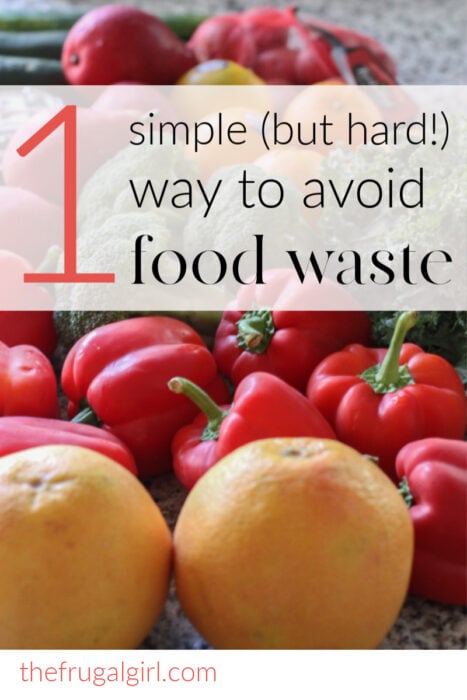
Here it is:
Eat more of your fruits and vegetables.
It’s not complicated.
But it is hard to do.
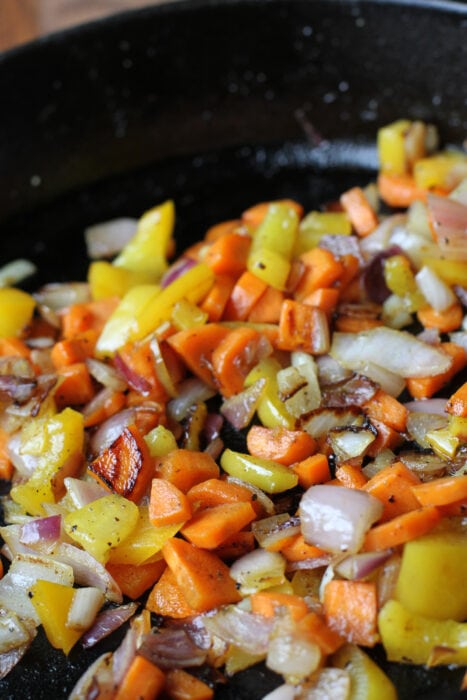
Why focus on fruits and veggies?
For one thing, they’re one of the food types most likely to be wasted.
(The FAO says fruits, vegetables, roots, and tubers have the highest wastage rates of any food.)
I see this borne out in my own home all the time.
Do I throw out moldy brownies very often?
Nope.
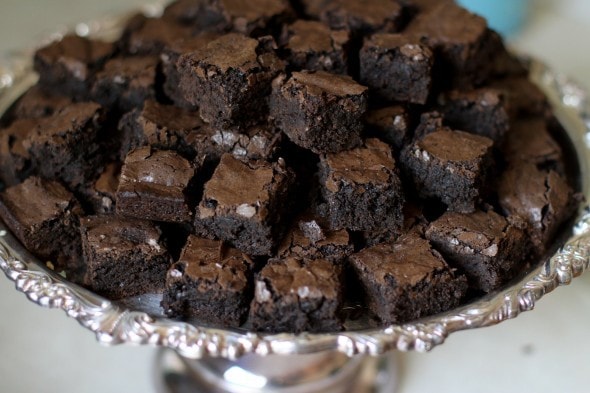
But I have composted a whole lot of moldy lettuce, mushrooms, and peppers.
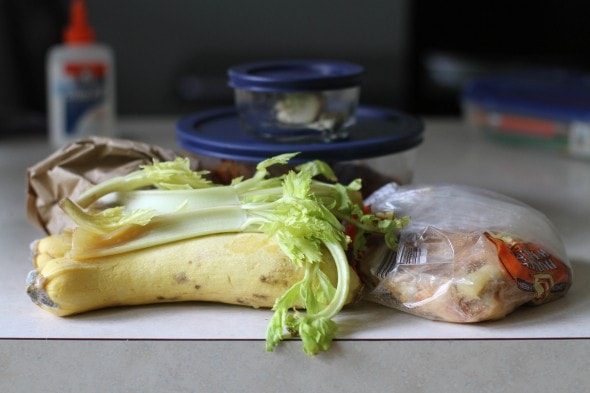
Why do we waste so much produce?
There are a couple of factors at play here, I think.
First, produce is not as much fun to eat as some other foods.
Most people would choose a chocolate chip cookie over a mushroom!
Secondly, produce requires more work than other foods.
You can just grab a handful of crackers right out of the box.
But if you want to eat a cucumber, you usually need to wash it and cut it up.
Thirdly, produce just does not last as long as those other fun-and-easy-to-eat foods.
Crackers, desserts, chips, muffins, and the like take much longer to go bad than produce does.
So. The odds are stacked against us when it comes to eating up the produce that we buy.
What can you do differently?
1. Get into the habit of produce-first thinking.
When you try to decide what to eat for breakfast, lunch, or a snack, look for produce first.
I’m not saying that you shouldn’t eat crackers or cereal or sandwiches. But before you grab those easy things, see if you can find a piece of produce.
2. Make your produce visible.
If you see it, you’re way more likely to eat it.
Keep it in the front of your fridge.
Use clear containers in the fridge.
Put produce on your main kitchen counter.
3. Prep some of it.
Some produce isn’t great for prepping, but a lot of it is.
I know my family is way more likely to eat grapes if they’re washed and divided into single-serving sections (I just use a kitchen scissors to cut the stems.)
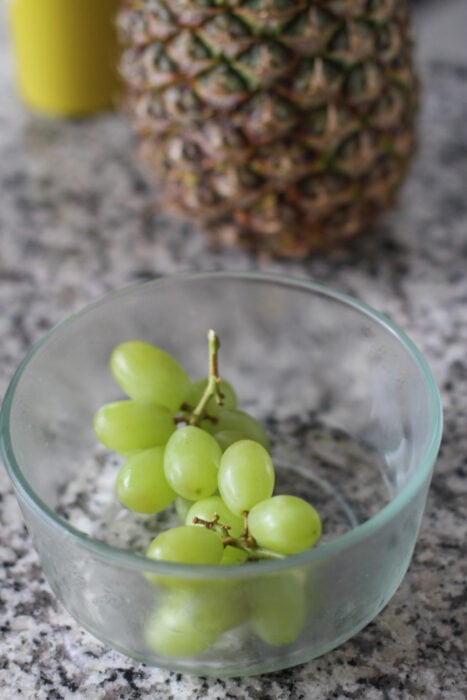
Pineapple will get eaten if it’s cut into chunks.
We all will snack on cucumbers if they’re sliced.
4. Think ahead about a produce side for dinner.
I am not 100% successful at this, but when I think ahead, I’m much more likely to saute asparagus, steam broccoli, or make a salad.
When I don’t think ahead, I end up slicing oranges or apples. Which is not terrible, but it’s better to serve a veggie at dinner, since we’ll probably eat the fruit at other times.
(We snack on oranges; no one here really snacks on asparagus. If you do snack on asparagus, I bow to you.)
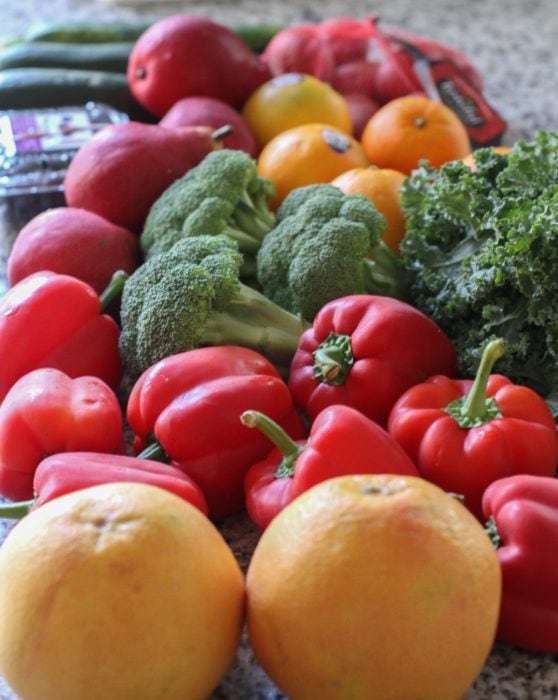
Despite my best efforts, I do still end up composting some uneaten produce.
BUT.
When I apply the four tips listed above, I am much more successful at getting our produce eaten before it goes bad.
What do you do to make sure your produce doesn’t turn into food waste?
P.S. I realize I could have added a fifth tip: don’t overbuy produce at the store in the first place. I do think mindful buying is a good idea, but I hesitated to include it in the list because most of us probably don’t need to buy less produce; we just need to eat more of it!
You could avoid produce waste entirely by buying only a little each week, but in that case, the cure is worse than the disease. I wrote a whole post about that, actually.

susan bloom
Saturday 1st of February 2020
I do not (anymore) buy more than I need. And I have become a fan of roasted veggies, such as brussel sprouts, those beautiful tri color bags of mini carrots (NOT baby carrots) that they sometimes have at Trader Joe's and sometimes zucchini and/or eggplant. I put them on a baking sheet and add various herbs and spices and coat in a bit of olive oil and roast them in the oven. The best way I know to get my veggies.
Jan
Friday 31st of January 2020
Flu season is in full swing here. I have an autoimmune so I stay close to home during the months of January February. This is the one time of the year that I don’t make it to Aldi to shop. Last week I placed my online pick-up order and when my husband brought all the groceries home they had accidentally put a huge bag of apples in with our groceries. Since apples are produce, I had to keep them. So, I got out my canning supplies and I made 10 cups of apple jelly. I would’ve made applesauce with what was left but I was too tired. WINNING
Kristen
Friday 31st of January 2020
Woohoo for saving the apples!
CNM
Thursday 30th of January 2020
One thing I try to do: when I'm making a meal plan/shopping, I'll get some veg that does not perish very readily. By this I mean things like cabbage, cauliflower, winter squashes, sweet potatoes, carrots-- things that will keep for weeks in the fridge. We try to eat the rapidly perishing veg like lettuces, summer squashes, mushrooms etc. first. That way, we can save the slower-rotting veg for the following week if we don't get to it.
FrankieGirl
Thursday 30th of January 2020
I buy most veggies as frozen as they are likely fresher than the stuff in the "fresh" produce section of the store (it's been written about extensively over the last few years but feel free to google that fact). We consume TONS of frozen veggies and they are so easy.
The fresh staples I always have on hand - onions and celery, bananas, clemintines - I monitor every few days, and if I can't use right then and they're getting iffy, I set aside time to wash, chop and/or freeze ALL of it. I have small plastic containers specifically meant for onions/celery (they tend to "perfume" any container used) and I use the frozen batches for soups, stews, or stir fry. Fruit is usually consumed, but sliced bananas freeze well.
I buy other fresh fruit/veggies ONLY when they are on super sale/clearance and prepare/consume same day. If I can't think of even a ghost of an idea of how to use them, they don't come home with me, but I might look up recipe ideas for next time.
I save my washed ends of the aromatics as well in a freezer bag for making stock.
We LOVE leftovers in my house. So I use up things and we eat on a specific recipe usually until it's gone. Making large batch meals also means I use up all the ingredients and in the event someone doesn't like leftovers (spices/flavors get BETTER the next day!) you can freeze and eat next week as a break from cooking. But batch cooking/eating also means you don't have to cook from scratch every single meal and meal planning is much easier since you're only cooking/planning for 2-3 days a week.
I agree that experimenting with new foods and getting variety into your diet is nice, but if the likelihood is you'll be too tired, don't like cooking, or just don't enjoy planning meals, sticking to standard ingredients for a small rota of recipes that everyone likes and are healthy/easy makes more sense.
It's the same idea for having a capsule wardrobe, or keeping your household items minimal and decluttered. Simple is sometimes best.
I'd love to post the rest of my suggestions, but keep getting "error, comment too long" and it won't let me type much. :(
Rebecca Stone
Tuesday 4th of February 2020
I only use transparent glass containers. If it's not seen and pretty, it gets forgotten. Vegetables last longer in glass and seem to dehydrate in plastic containers. I have the chopped bottom (green bits and core) of a cauliflower roasting in the oven now- tossed in bacon fat and garlic salt. Like another poster, I like all sorts of roasted veggies. Kale stems and broccoli stems are great steamed and added to stir fry or frittata- cut them crosswise in case they're tough and you won't know. My family won't ever choose vegetables, but if they are cut and in their path, they will eat them. A spiralizer is great for winter vegetables like beets and watermelon radish. Beets are too sweet to eat big chunks raw, but spiralized they are great. Spiralize butternut squash to cook instead of pasta. If I make my lunch a big salad the evening before, I love a nice salad at work. Caramelized onions and roasted sweet potatoes make it fancy. Planning ahead or prepping the veggies first is best. Get the protein part of the meal ready afterward.
priskill
Thursday 30th of January 2020
Yes Yes and Yes! So true and guilty as charged. From my slovenly place of existence I would add -- check through and organize all the stuff you do have! That has been the biggest challenge for me. Just this morning I was rooting thru the freezer for frozen blueberries for the oatmeal (none) and found all manner of stuff -- some of which I have no memory of buying, wrapping, or stashing. I did find frozen ground turkey dated from January 2019. I guess that will be the next meal.